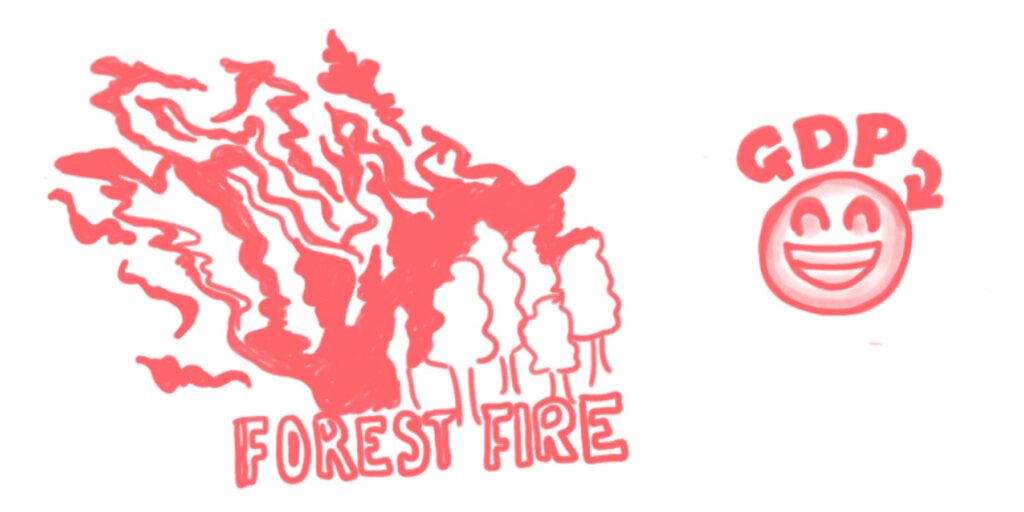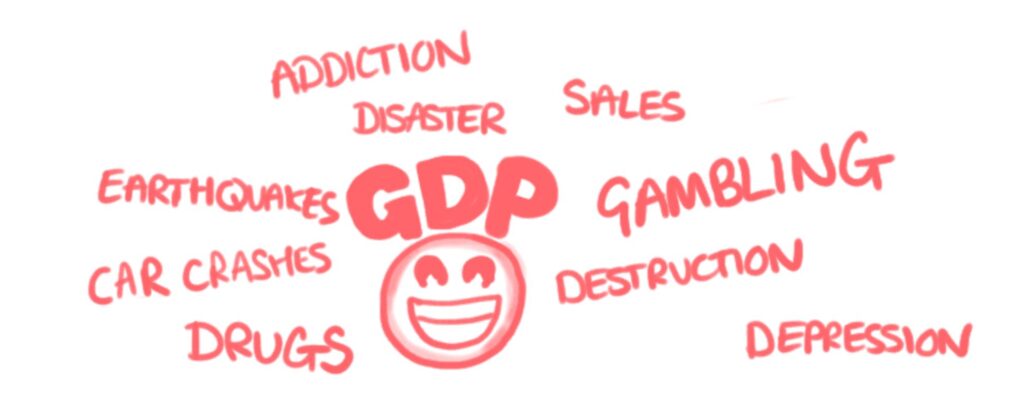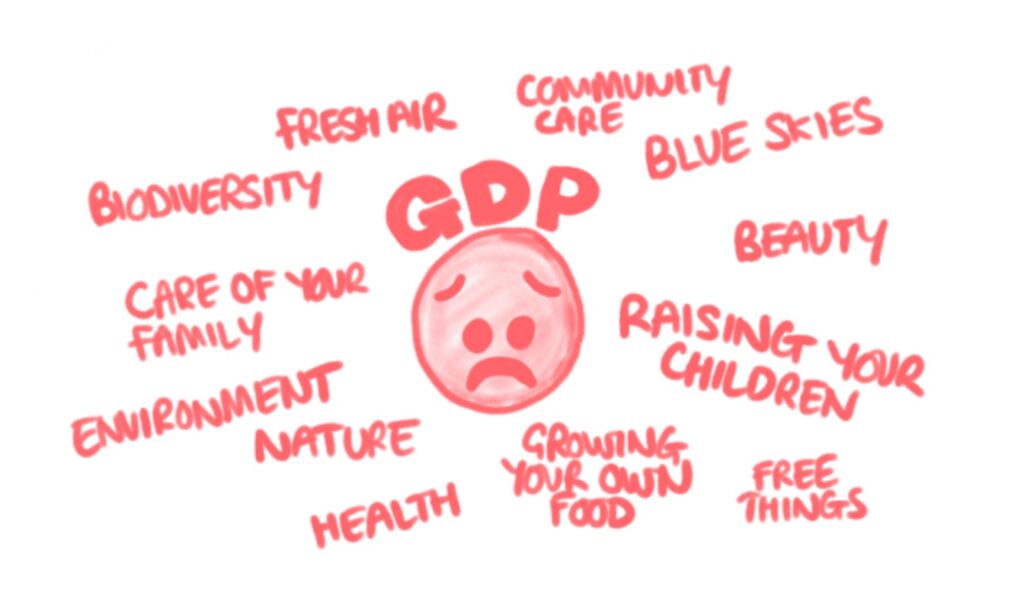What is GDP?
GDP which stands for Gross Domestic product is the number we use to rate how strong an economy is. The higher the GDP the more money and services are flowing and the more production in happening. This is good. Countries want a high GDP because even though it doesn’t technically mean “wealth”, it’s often taken to meet that.
When countries compete or try to show power on a world scale, this is the sort of thing they compete about.
It is literally the most important number that all politicians, economists cling on to and measure their work against. ‘GDP’ is always talked about in the media- this shows just how much value our society gives the metric.
Why is GDP NOT a good way to measure “wealth”?
GDP is the number that tells us how ‘rich’ a country is, or how ‘well’ it’s doing. These two things, however, aren’t necessarily linked.
We were all raised to understand that a strong economy is important and good for the people of a country. A strong economy means things are being produced and sold, money is flowing and there are plenty of jobs. That’s all true. But, the way we measure that (by GDP) isn’t quite right. There is nothing wrong with the GDP Indicator- but it measures only a certain type of ‘health’ of the economy- and so on it’s own it can’t actually give a picture of the way a country works.
Imagine the google review page for a restaurant. The rating a restaurant has will include lots of factors; how delicious the food it, staff friendliness, value for money, ambiance etc. If the google review were to ONLY consider some parts of that (for example speed of service) the restaurant will put more work into those areas. You might end up with a 5 star restaurant with no friendly customer service, just very speedy waiters. There’s nothing wrong with measuring speed of service, but we all know intuitively that that is only one part of the equation. It’s similar for GDP- it gives useful information on the things it measures, but it’s not the full picture.
So why do we use GDP and what are the consequences of that? (why does it matter that we use an indicator that isn’t ideal?)
It’s an important number because it’s what is used across the globe- and so countries need to “play the game” of working for a high GDP. Although fewer countries compete by invasion and war than in the past, there is still economic competition and power struggles. Since GDP is the norm, countries have to use it. And this is what makes it a problem.
Even if a country recognises that GDP doesn’t fully show the state of a country- by working to improve their GDP score, they are putting effort and value into the sectors that GDP values instead of sectors that they choose to value. In other words, they’ll give more importance to things that ARE included in the GDP metric. This skews the work of politicians and economists. And this leads to some crazy, warped outcomes:
What do a volcanic eruption, a car crash and a huge forest fire have in common? They are all good for GDP!
3 Reasons GDP is a bad measure of economic health:
- GDP doesn’t define productive economic activity (for example business for funeral parlors)
- It doesn’t add ‘costs’ when good things are destroyed (no cost for air pollution)
- It does not value productive activities that aren’t monetised (such as community care)
GDP of a country is the measure of economic activity. It does not measure productive economic activity, it does not include a cost factor for activities that reduce happiness, or that harm the environment, and it does not include a huge amount of very useful non monetised human activity.
Why is a forest fire good for GDP?
Let’s look at how the 3 points above create a GDP boost out of a huge human and natural disaster.

Forest fires boost economic activity:
These boosts in economic activity show the things the GDP DOES VALUE:
- The firefighters have lots of work. They spend money on fuel and equipment for their trucks that they use to fight the fire.
- People who have been hurt or experienced burns in the fire create great business for ambulance crews, hospitals and drugs companies. Health problems as a result of all the smoke inhaled by people for miles around will fuel the healthcare and drug industry for years to come.
- Those who are killed create great business for the funeral industry including all the contracted companies such as funeral caterers and florists. Deaths and loss of property create great economic activity for lawyers.
- Any property that’s burnt down will need rebuilding which is a huge economic boost for all the building contractor companies and creates employment for hundreds of workers.
- Anyone who becomes depressed from having lost their home or loved ones and turns to smoking, drinking or gambling is also excellent news for sales and economic activity in those areas.
The “only downside” to the fire is the loss of timber value from the wood in the trees that have burnt down.

The costs from a forest fire aren’t taken away from the productive economic activity:
There is no cost to the C02 emissions or smoke pollution that blackens the sky. The beauty of the countryside that’s lost once it’s all blackened shows no cost in GDP. There is no cost in the nostalgic value of the houses to the people. There is no cost in poor health, death, poor mental health. Any other species who are killed in the fires are insignificant in terms of GDP calculations.
Productive activities that aren’t monetised aren’t included in GDP:
Another significant part of the economy that gets excluded from the GDP is work that is productive to human lives and purpose, but that is not monetised. For example, growing your own food, or caring for your own children or elderly relatives. Anything boosting mental health and social relations, such as family time and community are also not included.

What’s the solution?
Is GDP such a bad measure that we need a whole new system? Wouldn’t all accounting systems have some problems? Can we adapts GDP to be better rather than having a whole new system?
Well, we could adapt it. We could add cost points (for example -1 point for 1kg of polluted air). We could find a way to add economic value for productive, un-monetised activities. In doing so though, we’d be altering the current economics to add value to the areas of life that we feel we want to value. For example, we’d value a local football game but not a massive car pile up on the motorway. To add economic value to these things, so that GDP becomes a batter indicator of ‘wealth in society’ is an exercise in thinking what we want to value.
There are lots of other indicators out there that we could actually use directly instead that start off prom a place of valuing things we WANT to value. So why not use those indicators. It can be done immediately, without having to wait for the whole economic accounting system to decide how we add value to un-values things.
Alternative ways to measure ‘wealth’ and ‘success’?
There are lots of alternatives and there are also examples of countries (such as Bhutan) who consciously make the decision of what is most important to their societies and create a metric that completely aligns with that. The ultimate metric for Bhutan? It’s not ‘GDP’, but ‘GNH’, gross national ‘Happiness’! See more about that here. This happiness measure is often quoted because its a nice idea.
There are definitely many other measures of the performance of a country. Genuine progress indicator (GPI) uses social and environmental factors to balance out economic part. The Human development index (HDI) is another popular metric for assessing prosperity. It has a more human approach and looks at per capita income, life expectancy and living standards, and education alongside economic growth. There is no right way to measure but whatever factors a country assesses will receive more attention.
Of course, this doesn’t stop GDP being important on a word stage YET. But if a government could show their success in boosting HDI for example, it may look less politically bad if GDP doesn’t rise in the same way.
Thank you!
Post any follow on question below and I will get back to you! Otherwise it would be lovely if you subscribed and joined this community. We are working together to understand our world, and the systems we interact with to be able to anlayse and proactively have more autonomy on how we want to live!
You might enjoy my posts on government debt which you can find here.
